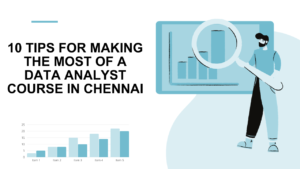Table of Contents
ToggleThe difficulty of coding in data science can vary depending on your prior experience and background. For individuals who are already familiar with programming concepts, learning data science coding can be manageable. However, if you are new to coding, there may be a learning curve involved.
Are you looking to become a Data science expert? Go through 360DigiTMG’s in Best Data Science in Bangalore.
Programming Languages:
Data scientists commonly use programming languages such as Python and R for data analysis, modeling, and visualization. These languages are known for their readability and ease of use, making them accessible for beginners. However, learning any programming language requires time and practice to become proficient.
Understanding Concepts: Data science coding involves understanding and applying various concepts such as variables, data structures, loops, functions, and control flow. These concepts are foundational to programming and are essential for performing data manipulation and analysis tasks.
Libraries and Frameworks: Data science libraries and frameworks, such as Pandas, NumPy, and scikit-learn in Python, provide pre-built functions and methods that simplify common data science tasks. While using these libraries can make certain aspects of coding easier, it is still important to have a solid understanding of the underlying concepts and how to apply them effectively.
Data Manipulation and Analysis:
A significant part of data science coding involves manipulating and analyzing data. This includes tasks such as cleaning and preprocessing data, handling missing values, performing statistical calculations, and applying machine learning algorithms. These tasks require an understanding of data structures and the ability to apply appropriate methods and techniques.
Algorithm Implementation: Data scientists may need to implement algorithms or modify existing ones to suit their specific needs. This can involve more advanced coding skills and an understanding of algorithmic principles. However, many common algorithms are already implemented in libraries, allowing data scientists to leverage existing code rather than starting from scratch.
Earn yourself a promising career in Best Data Scientist by enrolling in Best Data Science in Chennai Program offered by 360DigiTMG.
Continuous Learning: The field of data science is constantly evolving, with new techniques, libraries, and frameworks being developed. To stay up-to-date, data scientists need to engage in continuous learning and adapt to emerging trends and advancements in the field. This requires a commitment to ongoing self-improvement and keeping up with the latest developments in coding and data science practices.
While coding in data science can have its challenges, it is important to approach it with a growth mindset and view it as a skill that can be developed over time with practice and dedication. There are ample online resources, tutorials, and courses available to help you learn and improve your coding skills in the context of data science. Additionally, collaborating with other data scientists and participating in coding projects can provide valuable learning opportunities and help you become more proficient in coding for data science.
Debugging and Problem-Solving:
Like any form of coding, data science coding requires the ability to identify and resolve errors or bugs in your code. Debugging skills are crucial for troubleshooting issues that may arise during data analysis, algorithm implementation, or model training. Developing problem-solving skills and learning how to effectively debug code will help overcome challenges in data science coding.
Math and Statistics Understanding: Data science involves working with data and applying mathematical and statistical concepts to analyze and interpret it. While coding itself may not be inherently difficult, having a solid understanding of mathematical and statistical concepts is important for effectively applying algorithms, interpreting results, and drawing meaningful insights from data.
Complex Algorithms and Techniques: As you progress in data science, you may encounter more complex algorithms and techniques. Implementing and understanding advanced machine learning algorithms, deep learning models, or natural language processing techniques can require a deeper understanding of coding and the underlying principles. However, these advanced concepts can be learned gradually as you gain more experience and knowledge in data science.
Learn the core concepts of Data Analytics Course video on Youtube:
Domain Knowledge: Depending on the specific domain you’re working in, you may need to acquire domain-specific knowledge to effectively apply data science techniques. Understanding the context and nuances of the data you’re working with can impact the complexity of the coding required. Developing domain expertise alongside coding skills will enhance your ability to handle data science tasks effectively.
Looking forward to becoming a Data scientist Expert? Check out the Best Data Science in Pune and get certified today.
Iterative Process:
Data science coding often involves an iterative process of experimentation, testing, and refining. It may require trying different approaches, adjusting parameters, and analyzing results to optimize your models or analyses. This iterative nature can sometimes be challenging, as it requires patience, persistence, and the ability to handle complex datasets and changing requirements.
Collaboration and Communication: Data science projects often involve collaboration with team members, stakeholders, and domain experts. Effective communication and collaboration skills are crucial for understanding project requirements, discussing coding approaches, and presenting findings. While not directly related to the difficulty of coding itself, these skills play a significant role in successful data science projects.
Remember that while coding in data science can be challenging at times, it is a skill that can be developed with practice and experience. Taking a structured approach to learning, breaking down complex problems into smaller manageable tasks, seeking guidance when needed, and actively engaging in coding projects will help you build confidence and proficiency in data science coding. Embrace coding challenges as opportunities for growth and keep a curious and open mindset as you navigate the exciting world of data science.
Data Wrangling: Data scientists often spend a significant amount of time cleaning and preparing data for analysis. This process, known as data wrangling or data preprocessing, involves handling missing values, dealing with outliers, transforming variables, and merging data from multiple sources. Data wrangling can sometimes be complex and time-consuming, requiring coding skills to manipulate and transform data effectively.
Performance Optimization:
As datasets and computational requirements grow, optimizing the performance of data science code becomes important. This involves improving the efficiency of algorithms, utilizing parallel computing techniques, and optimizing memory usage. Performance optimization can require a deeper understanding of coding and the underlying hardware architecture.
Big Data and Distributed Computing: With the exponential growth of data, data scientists often encounter big data challenges that require distributed computing frameworks such as Apache Hadoop or Apache Spark. Working with big data involves coding in distributed environments and handling data across multiple nodes, which adds an additional layer of complexity to data science coding.
Software Engineering Practices: While data science coding focuses on data analysis and modeling, incorporating software engineering practices can enhance the quality and maintainability of code. This includes writing modular and reusable code, implementing version control systems, and following coding standards. Adopting good software engineering practices may require learning additional tools and techniques beyond basic coding skills.
360DigiTMG the award-winning training institute offers a Best Data Science in Hyderabad. and other regions of India and become certified professionals.
Keeping Up with Advancements:
The field of data science is dynamic and constantly evolving, with new algorithms, techniques, and tools emerging regularly. Staying up-to-date with the latest advancements requires continuous learning and keeping pace with the evolving landscape of data science coding. This commitment to learning and staying current can present its own challenges.
Domain Complexity: Data science projects often involve working with complex real-world problems that require a deep understanding of the domain. Coding in data science goes beyond simply writing code; it involves understanding the context, asking the right questions, and translating domain-specific requirements into code. Gaining domain knowledge alongside coding skills can be a significant challenge.
While coding in data science may have its difficulties, it is important to note that proficiency in coding is a skill that can be developed with time, practice, and dedication. There are numerous online resources, courses, and communities available to support learning data science coding. Leveraging these resources, engaging in hands-on projects, and seeking guidance from experienced data scientists can help overcome challenges and improve your coding abilities in the context of data science. With perseverance and a growth mindset, you can successfully navigate the complexities of coding in data science.
Data Science Placement Success Story
Data Science Training Institutes in Other Locations
Tirunelveli, Kothrud, Ahmedabad, Hebbal, Chengalpattu, Borivali, Udaipur, Trichur, Tiruchchirappalli, Srinagar, Ludhiana, Shimoga, Shimla, Siliguri, Rourkela, Roorkee, Pondicherry, Rajkot, Ranchi, Rohtak, Pimpri, Moradabad, Mohali, Meerut, Madurai, Kolhapur, Khammam, Jodhpur, Jamshedpur, Jammu, Jalandhar, Jabalpur, Gandhinagar, Ghaziabad, Gorakhpur, Gwalior, Ernakulam, Erode, Durgapur, Dombivli, Dehradun, Cochin, Bhubaneswar, Bhopal, Anantapur, Anand, Amritsar, Agra , Kharadi, Calicut, Yelahanka, Salem, Thane, Andhra Pradesh, Greater Warangal, Kompally, Mumbai, Anna Nagar, ECIL, Guduvanchery, Kalaburagi, Porur, Chromepet, Kochi, Kolkata, Indore, Navi Mumbai, Raipur, Coimbatore, Bhilai, Dilsukhnagar, Thoraipakkam, Uppal, Vijayawada, Vizag, Gurgaon, Bangalore, Surat, Kanpur, Chennai, Aurangabad, Hoodi,Noida, Trichy, Mangalore, Mysore, Delhi NCR, Chandigarh, Guwahati, Guntur, Varanasi, Faridabad, Thiruvananthapuram, Nashik, Patna, Lucknow, Nagpur, Vadodara, Jaipur, Hyderabad, Pune, Kalyan.
Data Analyst Courses In Other Locations
Tirunelveli, Kothrud, Ahmedabad, Chengalpattu, Borivali, Udaipur, Trichur, Tiruchchirappalli, Srinagar, Ludhiana, Shimoga, Shimla, Siliguri, Rourkela, Roorkee, Pondicherry, Rohtak, Ranchi, Rajkot, Pimpri, Moradabad, Mohali, Meerut, Madurai, Kolhapur, Khammam, Jodhpur, Jamshedpur, Jammu, Jalandhar, Jabalpur, Gwalior, Gorakhpur, Ghaziabad, Gandhinagar, Erode, Ernakulam, Durgapur, Dombivli, Dehradun, Bhubaneswar, Cochin, Bhopal, Anantapur, Anand, Amritsar, Agra, Kharadi, Calicut, Yelahanka, Salem, Thane, Andhra Pradesh, Warangal, Kompally, Mumbai, Anna Nagar, Dilsukhnagar, ECIL, Chromepet, Thoraipakkam, Uppal, Bhilai, Guduvanchery, Indore, Kalaburagi, Kochi, Navi Mumbai, Porur, Raipur, Vijayawada, Vizag, Surat, Kanpur, Aurangabad, Trichy, Mangalore, Mysore, Chandigarh, Guwahati, Guntur, Varanasi, Faridabad, Thiruvananthapuram, Nashik, Patna, Lucknow, Nagpur, Vadodara, Jaipur, Hyderabad, Pune, Kalyan, Delhi, Kolkata, Noida, Chennai, Bangalore, Gurgaon, Coimbatore.
Navigate to Address:
360DigiTMG – Data Science Course Training in Chennai, Data Analytics, AI Institute in Anna Nagar
Ground floor, Fuel WorkSpaces, 25, 15th Main Rd, H Block, Anna Nagar, Ranganathan Garden, Anna Nagar, Chennai, Tamil Nadu 600040
Phone: 1800 212 654 321
Source Link: it companies in anna nagar
GET THE DIRECTION: Best data science training in chennai




